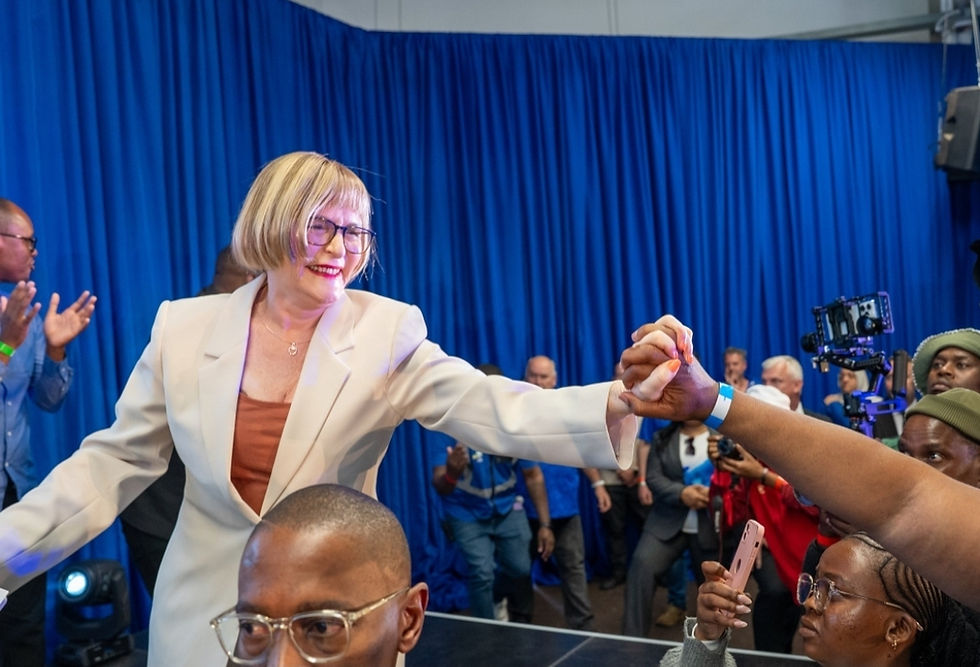DA's Zille Nomination: A Recipe for Disaster in Johannesburg
- Mpho Dube
- Sep 23, 2025
- 3 min read

DA leader Helen Zille
By Mpho Dube-Editor in Chief of The Azanian
The Democratic Alliance's decision to nominate 74-year-old Helen Zille as its mayoral candidate for Johannesburg has sparked controversy, raising questions about the party's commitment to promoting black leadership.
This move seems to underscore the perception that the DA doesn't truly believe in black leaders, especially when capable leaders like Solly Msimanga, the DA's Gauteng Provincial Leader and Leader of the Official Opposition in the Gauteng Provincial Legislature, were overlooked for this role.
The DA's nomination of Zille raises concerns about the party's leadership pipeline and whether it has a bankruptcy of leadership. With Zille being a septuagenarian, many are wondering if the DA has exhausted its pool of potential leaders, forcing them to rely on someone who's nearing the twilight years of her life.
This decision may ultimately prove to be a leadership failure, as it may alienate younger voters and undermine the party's efforts to promote diversity and inclusion.
Zille's nomination is particularly contentious given her past controversies, including allegations of racism. Former DA leader Mmusi Maimane's resignation highlights the party's struggles with racial inclusivity.
Maimane cited difficulties in making the DA appeal to black voters, noting that some party members didn't share his vision for a more inclusive direction. Herman Mashaba, another former DA leader, also quit the party over its approach to racial inequality. These incidents suggest that the DA's nomination of Zille might be a step backwards for black leadership.
The DA's nomination of Zille sends a message that white leadership is still preferred, undermining the progress made towards promoting black leadership. In a democratic state like South Africa, leadership should reflect the country's diverse population. Black people must be given a chance to lead and contribute to the country's growth and development. By nominating Zille, the DA may be overlooking the potential of younger, black leaders who could bring a dynamic and forward-thinking approach to governance.
Johannesburg is grappling with crumbling infrastructure, inadequate service delivery, and unstable coalitions. The city's deterioration has happened largely under the ANC's leadership since 2019. While the DA has a track record of good governance in cities like Cape Town, its nomination of Zille raises concerns about its commitment to promoting diversity and inclusion. The party's decision may ultimately prove to be a recipe for disaster, as it may fail to resonate with voters and undermine its chances in the elections.
As the city navigates its complex challenges, it's essential that political parties prioritize diversity and equality in their leadership choices. The DA's nomination of Zille is a stark reminder of the party's apparent disregard for black leadership. It's time for the party to rethink its approach and prioritize the development of black leaders who can drive meaningful change in the city.
In conclusion, the DA's nomination of Helen Zille as its mayoral candidate for Johannesburg raises important questions about the party's commitment to promoting black leadership and addressing racial inequities. As South Africa continues to navigate its complex history and strive for a more inclusive future, it's essential that political parties prioritize diversity and equality in their leadership choices.
Mpho Dube is The Editor in Chief, Founder and Publisher of The Azanian online national and international publication. He also won three national awards for The Caxton/The Citizen. He was also endorsed to serve at the Pan African Parliament (PAP).




Comments